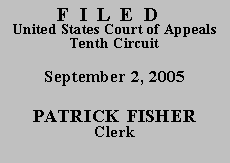

| UNITED STATES OF AMERICA, |
|
| v. | |
| JOSE ALFREDO VARELA-ORTIZ, |
Factual and Procedural Background In 2002, Mr. Varela-Ortiz pled guilty to possession with intent to distribute less than 500 grams of a mixture or substance containing a detectable amount of cocaine, and aiding and abetting the same, in violation of 21 U.S.C. §§ 841(a)(1) and (b)(1)(C), and 18 U.S.C. § 2. He was sentenced to 18 months in prison, followed by 3 years of supervised release. On June 5, 2004, Mr. Varela-Ortiz was arrested and charged with illegal re-entry after deportation, to which he pled guilty on July 21, 2004. At the sentencing hearing, the district court adopted the pre-sentence report ("PER") and sentenced Mr. Varela-Ortiz at the bottom of the recommended Guidelines range, to 46 months in prison. The district court also sentenced him to 6 months in prison for violating his supervised release, to run concurrently with the 46-month sentence.
On appeal, counsel for Mr. Varela-Ortiz filed a brief pursuant to Anders v. California, 386 U.S. 738 (1967), and moved to withdraw as counsel. If counsel conscientiously examines a case and determines that any appeal would be wholly frivolous, Anders authorizes counsel to so advise the court and request permission to withdraw. Id. at 744. Counsel must submit a brief to both the appellate court and the client pointing to anything in the record that would potentially present an appealable issue. Id. The client may then choose to offer any argument to the court. Id. If the court, upon completely examining the record, determines that the appeal is in fact frivolous, it may grant counsel's request to withdraw and dismiss the appeal. Id. In the present case, counsel, acting pursuant to Anders, provided Mr. Varela-Ortiz with a copy of his appellate brief and Mr. Varela-Ortiz filed a pro se brief raising one additional argument.
Mr. Varela-Ortiz challenges both aspects of his sentence--the 46-month sentence for illegal re-entry and the 6-month concurrent sentence for violation of supervised release--on the basis of the Supreme Court's recent decision in United States v. Booker, 125 S.C. 738 (2005). The government has not moved to enforce his waiver of appellate rights, and we therefore proceed to the merits. See United States v. Clark, 415 F.3d 1234, ___ n.1 (10th Cir. 2005).Discussion There are two types of Booker error: constitutional Booker error and non-constitutional Booker error. See United States v. Gonzalez-Huerta, 403 F.3d 727, 731 (10th Cir. 2005). A court commits constitutional Booker error when it mandatorily increases a sentence on the basis of judge-found facts other than the fact of a prior conviction. Id. A court commits non-constitutional Booker error when it applies the Guidelines in a mandatory, rather than discretionary, fashion. Id. at 731-32.
Mr. Varela-Ortiz did not raise the Booker argument in district court, so we review his sentence for plain error. Id. at 732. "Plain error occurs when there is (1) error, (2) that is plain, which (3) affects substantial rights, and which (4) seriously affects the fairness, integrity, or public reputation of judicial proceedings." Id.
Mr. Varela-Ortiz's first argument is that the district court committed non-constitutional Booker error by applying the Guidelines mandatorily when it sentenced him to 6 months in prison for violation of his supervised release. However, sentences for violating supervised release are imposed pursuant to Chapter 7 of the Guidelines, and Chapter 7 was already considered advisory prior to Booker. See United States v. Lee, 957 F.2d 770 (10th Cir. 1992). Accordingly, the sentence imposed by the district court involved no non-constitutional Booker error.
Mr. Varela-Ortiz also argues that the district court committed non-constitutional Booker error by imposing his 46-month sentence pursuant to then-mandatory Guidelines. At the sentencing hearing, the district court adopted the PER's factual findings and Guidelines applications, which yielded a recommended Guidelines range of 46 to 57 months. The district court sentenced Mr. Varela-Ortiz at the bottom of that range. Our cases establish that this is an error that is plain. See Gonzalez-Huerta, 403 F.3d at 732. However, in order to satisfy the fourth prong of plain error analysis--that the error seriously affect the fairness, integrity, or public reputation of judicial proceedings--Mr. Varela-Ortiz must also demonstrate that the error was "particularly egregious." Id. at 736. Mr. Varela-Ortiz points to nothing in the record that would satisfy that standard. The circumstances of this case are "run of the mill." United States v. Trujillo-Tauruses, 405 F.3d 814, 820 (10th Cir. 2005). Mr. Varela-Ortiz pled guilty and had nothing remarkable in his criminal history, and the district court straightforwardly applied the Guidelines and sentenced him at the bottom of the recommended Guidelines range. His sentence is therefore typical of the range imposed upon similarly situated defendants who have committed similar crimes. Nothing in this non-constitutional Booker error impugns the fairness, integrity, or public reputation of judicial proceedings, and relief on plain error review is therefore inappropriate.
Finding no non-frivolous arguments on appeal, we grant counsel's motion to withdraw and dismiss the appeal. The judgment of the United States District
Court for the District of New Mexico is AFFIRMED.
Entered for the Court,
Michael W. McConnell,
Circuit Judge
*.After examining the briefs and appellate record, this panel has determined unanimously that oral argument would not materially assist in the determination of this appeal. See Fed. R. App. P. 34(a)(2); 10th Cir. R. 34.1(G). This case is therefore submitted without oral argument. This order and judgment is not binding precedent, except under the doctrines of law of the case, res judicata, and collateral estoppel. The court generally disfavors the citation of orders and judgments; nevertheless, an order and judgment may be cited under the terms and conditions of 10th Cir. R. 36.3.